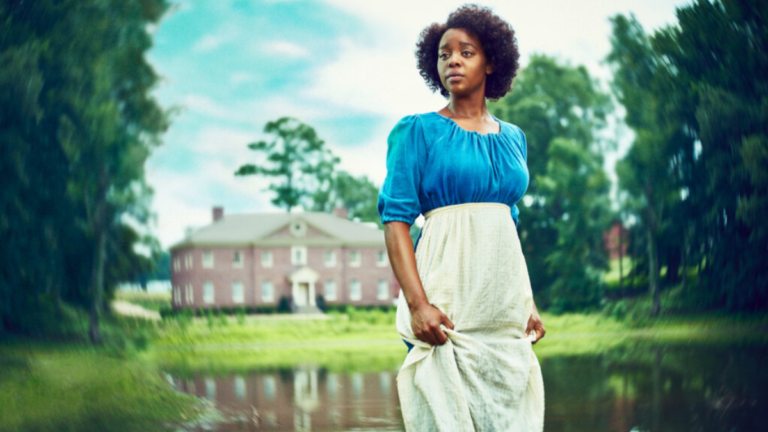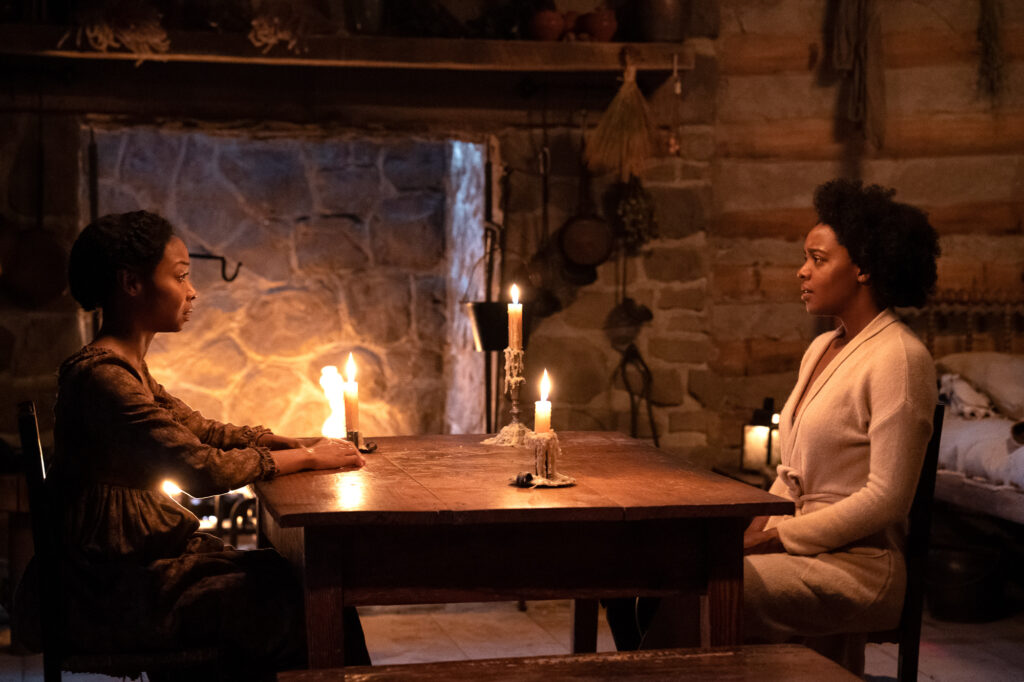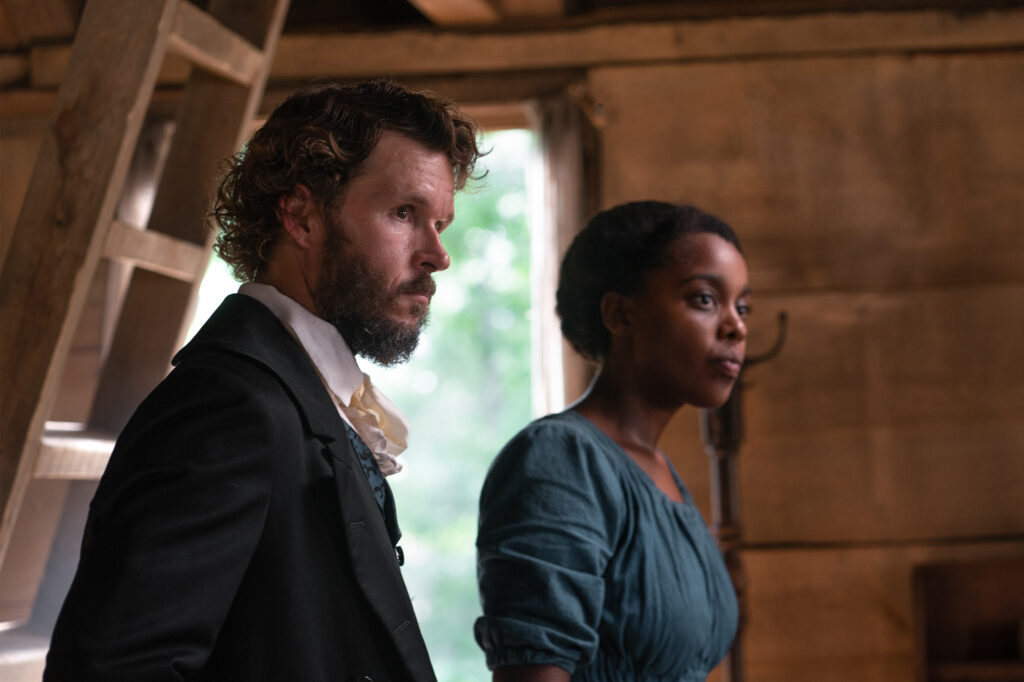
By Carla Hay
NABJ Black News & Views
What if you were caught between the modern world and the days of slavery in America due to involuntary time travel? That’s the premise of Octavia E. Butler’s beloved sci-fi novel “Kindred,” which was first published in 1979. The novel has been adapted into an eight-part limited series of the same name. On December 13, it will debut as an FX on Hulu show.
A 26-year-old Black woman named Dana James (played by Mallori Johnson) moves from New York City to Los Angeles to become a screenwriter in the “Kindred” TV series, which is a faithful adaptation of the book. It is the year 2016. Dana has only recently moved into her new home when her world is transformed into 1815 and her life as an enslaved woman on a Georgia plantation. She appears to be dragged back and forth between these two time periods at random.
A series of terrifying events follow, including Dana’s attempts to solve the time-travel mystery and flee the racist family who owns the plantation. Secrets from her family’s past emerge as well. Unlike many scripted TV shows that feature the enslavement of Black people as a major plot point, “Kindred” is backed by Black women who serve as the majority of the show’s directors. NABJ Black News & Views recently spoke with Johnson and showrunner Branden Jacobs-Jenkins about creating this gripping and meaningful adaptation of Butler’s book.
What surprised you the most during the production of “Kindred”?
Johnson: The emotional journey of the series was definitely what surprised me the most. Of course, I knew it would be a lot when I read the material. I knew it was going to take a lot of effort from me.
But as time passed, I discovered that I was unravelling in a variety of ways. I felt like I grew up alongside the characters on the show. As the show progressed, each episode unlocked more and more of my potential as an actor and artist… I never expected it to have such an insidious effect on me in the way that it did, but I’m glad it did.
Jacobs-Jenkins: I was astounded by how hot Atlanta could get. “How are we doing this right now?” I wondered on some days. I was surprised by how many people are looking forward to the show and are so invested in this book. We had a lot of people on our crew who were huge fans of Octavia Butler.
And it was very motivating to come to a place where many people saw it as more than just a job. It was really a way of honouring or fulfilling her legacy. It had a profound effect on me. On the first day, our production office was covered in posters of her (Octavia Butler’s) face. I’ve always loved this book, but it’s always surprising to find someone else who shares your enthusiasm.

“Kindred” was shot in Georgia at locations where real-life enslavement occurred. Mallori, you and the other members of the “Kindred” team have discussed how knowing the history of these locations had a profound emotional impact on you. How did you deal with it personally, given that you were fully immersed in the role of someone who had experienced slavery as part of her life?
Johnson: There were times when I couldn’t deal with the show’s emotional journey. It’s a huge and devastating thing to experience and remember what my forefathers went through. To actually see and recreate it is not what you expect when you step into something like that. But, at the end of the day, as we neared the end of the show, I found myself exhausted and tired, feeling what I perceived my character to be carrying throughout the show.
There was something about that that I found rather lovely. As an actor, I kind of like it. That may not be healthy, but I think it’s lovely. I enjoy inviting characters into my life. I enjoy inviting that emotional heaviness into myself because every time I tell stories like this — especially ones that are true history and true to how I came to be here on this land — I feel like I’m holding a candle for the people who have gone through it. It was something I really appreciated.
What are your thoughts on critical race theory? And how did critical race theory influence your approach to making “Kindred”?
Jacobs-Jenkins: As someone who has studied critical race theory, I can tell you that the way it is currently understood in the mainstream is not entirely accurate. As far as I can tell, critical race theory had no impact on the project. But I believe we shared a genuine desire to add dimension and truth to how we think about slavery in the popular imagination. Nothing, in my opinion, has done more damage to our ability to understand our history than film and television.
I believe Octavia Butler wrote this book to make a literary intervention at the time. She didn’t have any real resources. She did her own research on these topics. We both felt the same way. We want to create something that changes how we think about slavery, how we think about American history, and how we think about American identity.

Branden, you wrote Episodes 1 and 2 of “Kindred” and co-wrote Episode 8. You also hired a diverse group of writers and directors for the series, with the majority of the directors being Black women. What are your thoughts on these hiring decisions?
Jacobs-Jenkins: I was really interested in involving as many different artists as possible. A Black British woman [Destiny Ekaragha] is one of our directors. Janicza Bravo, our pilot’s director, is of Panamanian descent and grew up in Brooklyn. It was all about deconstructing any essentialist notions of what it means to be a Black artist. Ayoka Chenzira, who directed “Kindred” Episodes 4 and 5, is a visionary filmmaker who works alongside Julie Dash and Arthur Jafa.
They are just as qualified as anyone else. But I was also interested in putting different characters with different stakes in the story in conversation with one another. I didn’t want to create some kind of dogmatic, homogeneous world. I was looking for something prismatic and three-dimensional. It had to begin with the hiring. It had to begin with the artists and leaders at the top.
We chose Atlanta because it has one of the country’s most diverse filmmaking communities. This applies to everyone from camera operators to department heads. In Atlanta, some of the most qualified individuals are people of color. As a result, it simply made the job easier.
What would you say to people who are hesitant to watch “Kindred” because they believe there are already too many TV shows and movies depicting Black enslavement?
Johnson: This isn’t just a story about slavery, in my opinion. It is not a history lesson. This is a story about a young woman today who has the power to change history. It’s told from a different point of view. It’s told from a new perspective, a modern perspective, and with a reflective eye. We are not simply repeating what has already been said or done. The manner in which it is told is somewhat revolutionary.
At the same time, I understand why people might not want to see that… It’s fine if it’s too much for some people. At the same time, everyone who worked on this show did so with care, respect, and consideration. We’re not making a show of what slavery was, the trauma of slavery. We’re presenting it in a different, proud, and upheld light. It seems very dignified to me.
Jacobs-Jenkins: To those who believe there is too much of this (slavery) stuff out there, I would argue that there isn’t. Only Black creatives are asked that question or told that there is a quota on what they can write about. Nobody tells people to stop making TV shows about wealthy white families who do bad things.
You don’t have to watch anything you don’t want to watch, in my opinion. We invite you to watch it. Allow yourself plenty of time. There’s no need to rush. If you’re curious, read the book first. I’d like us to look into the impulse to police the work that Black artists get to make about their history.